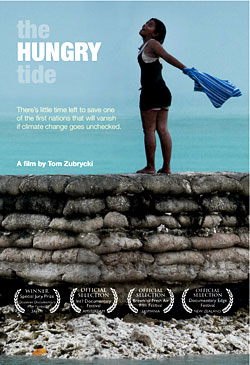 The central Pacific nation of Kiribati is expected to be one of the first countries to disappear as a result of climate change. Sea level rise and increasing salinity are threatening the homes and lives of 105,000 residents spread over 33 atolls. One of the least developed countries in the world, Kiribati has contributed little to worldwide carbon emissions, yet has the most to lose from global warming.
The central Pacific nation of Kiribati is expected to be one of the first countries to disappear as a result of climate change. Sea level rise and increasing salinity are threatening the homes and lives of 105,000 residents spread over 33 atolls. One of the least developed countries in the world, Kiribati has contributed little to worldwide carbon emissions, yet has the most to lose from global warming.
THE HUNGRY TIDE shows clearly the tragic impact of climate change on Kiribati, and exposes the stark global inequalities driving the global warming phenomenon. The film personalizes the story by following the life and work of Maria Tiimon, who evolves to become one of the most prominent advocates for the rights of Pacific Islanders. Originally from Kiribati, Maria works for an organization in Sydney as an impassioned campaigner for her sinking nation.
A rather shy Maria travels to the Climate Change Conference in Copenhagen to press for a new binding treaty to dramatically reduce greenhouse emissions. "Industrial countries are causing change in the climate," she says, "and we are the first to feel the consequences." Later, as a more confident advocate, she travels to Cancun for the next Climate Change Conference (COP16).
While Maria's life and work unfold, the situation in Kiribati deteriorates. Seawalls protecting an entire community are swept away. Only decisive global action will save Kiribati from disappearing. But pledges made at the climate change conferences to cut carbon emissions have fallen far short of their targets. And promises to assist poorer countries to adapt to climate change haven't materialized. As a result, Kiribati's President believes that relocation may be the only option. "To plan for the day when you no longer have a country is indeed painful but I think we have to do that."
DOWNLOADABLE SCREENING GUIDE & PUBLICITY MATERIALS AVAILABLE.
Support Pacific Islands by taking action on climate change
NOW!
1. EDUCATE YOURSELF and OTHERS
-
Buy a copy of the film 'the Hungry Tide' and show it to your friends.
-
Talk about climate justice in all your networks. Spread messages about your concern on social media.
-
Invite a speaker from the Pacific Calling Partnership to your school, community group or church.
-
Read articles and reports on the PCP website www.erc.org.au/pcp
-
Order PCP resources: DVDs, music CD, and resource kit
2. BE THE CHANGE YOU WANT TO SEE
-
Change your own behaviour to cut back on greenhouse gas emissions.
Per capita, the US and Australia are among the world's highest emitters of greenhouse gases. Countries like Kiribati and Tuvalu contribute the least yet are asked to pay the highest price. The more we can do as individuals to conserve energy, the easier the burden on others. So for the sake of our Pacific Island neighbours:
-
Turn off lights, use public transport and walk, eat less meat, responsibly use water, use the sun to dry clothes, recycle, and carefully protect the environment in your home, town and nation.
-
Support legislation to cut back greenhouse gases and develop clean energy.
3. Join the Pacific Calling Partnership
The Pacific Calling Partnership listens to and responds to messages from Pacific Island Nations on climate change.
-
Receive regular updates and invitations to action:
Email PCP Secretary at: [email protected]
4. GIVE FINANCIAL SUPPORT
-
Donate to the Pacific Calling Partnership or other NGOs advocating for climate justice for the Pacific Islands. Go to www.erc.org.au/pcp for on line donations.
-
Donate to Aid and development NGOs conducting education and adaptation programs on Pacific Islands.
5. ADVOCATE FOR CHANGE
-
Write to, visit, or phone your Congress Representative or Senator urging him/her to raise the issue in their party AND call for climate justice for front-line vulnerable states, to support Kyoto2.
-
Suggest they visit Kiribati or Tuvalu and listen to what people there have to say.
-
Write articles and/or letters to newspapers, or on social media supporting the needs of Pacific Island nations.
-
Urge your government to take a lead in mobilising the international community to provide appropriate resources for adaptation for front-line vulnerable states by contributing generously to the Green Climate Fund.